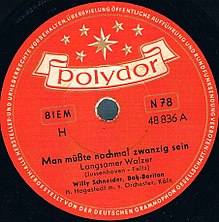Hermann Hagestedt
Hermann Hagestedt (born May 10, 1903 in Monbijou near Malmedy ; † December 23, 1976 in Dahlhausen (Hennef) ) was a German conductor who mainly worked for the West German radio and became publicly known.
Life
In 1907 Hagestedt came to Moers , where he attended elementary school and the humanistic grammar school. The good student stated comedian as his career goal, but still thought about it and embarked on a career as a musician. He studied violin with Marcel Clerc in Duisburg and since 1921 at Walter Schulze-Prisca in Cologne, where he and Jobs underground for his livelihood made. He completed his studies with Carl Körner at the Cologne University of Music from 1925 to 1930. In 1930 he became concertmaster and deputy conductor of the Cologne Philharmonic Orchestra. He had to give up playing the violin in 1934 because of a nerve inflammation in his left arm. So he shifted his activities to conducting.
In 1932 he became a member of the West German Chamber Orchestra under the direction of Hermann Spitz in the West German Radio and soon became concertmaster there. In 1934 he switched from the violin bow to the baton and took over as conductor of the West German Chamber Orchestra, from which the Hermann Hagestedt Orchestra emerged in 1936 with around 20 members. But there was also a wide range of activities outside of the station. During the war he played with his dance orchestra in front of the German occupation troops . Immediately after the war, he and his orchestra members built the core of what is now the WDR Radio Orchestra in Cologne . He was a guest with Hermann Hagestedt and his orchestra at men's choirs and he regularly accompanied the ceremonial sessions of the Cologne Carnival with instruments and played the associated carnival songs, such as On Ash Wednesday is all over (1950) and We are all in heaven (1952; each Jupp Schmitz ) on records.
He mainly accompanied pop singers on recordings , for example Jupp Schmitz on his carnival song Who should pay for that? (taken on October 21, 1949) or Willy Schneider at One should be twenty again (June 1953). Almost all of Willy Schneider's recordings for Polydor were accompanied by music by Hagestedt's orchestra. However, Hagestedt also played a number of titles from the field of upscale light music for Polydor. In 1959 he was also commissioned to conduct the television production Peterchens Mondfahrt (premiere on December 25, 1959). Until 1968 Hagestedt directed the orchestra named after him at WDR, with which he produced a large number of recordings for WDR. He was succeeded as orchestra leader in 1968 by Curt Cremer and Heinz Geese of the ensemble now operating as the Kölner Rundfunkorchester . Hagestedt had reached retirement age in 1968.
Hermann Hagestedt was buried in Cologne's north cemetery.
Sound documents (without singles)
- WDR midday concerts with Hermann Hagestedt (3-CD box), TMK, 2011.
literature
- Hermann Hagestedt: Hagestedt, Hermann . In: Dietrich Kämper (ed.): Rhenish musicians. Volume 6 (= Working Group for Rhenish Music History (Ed.): Contributions to Rhenish Music History, Volume 80), Arno Volk-Verlag, Cologne 1969, p. 70 ( excerpt )
Web links
- Discography at charts.de
- Hermann Hagestedt at Discogs (English) (with name variants)
| personal data | |
|---|---|
| SURNAME | Hagestedt, Hermann |
| BRIEF DESCRIPTION | German conductor |
| DATE OF BIRTH | May 10, 1903 |
| PLACE OF BIRTH | Monbijou at Malmedy |
| DATE OF DEATH | 23rd December 1976 |
| Place of death | Dahlhausen (Hennef) |
